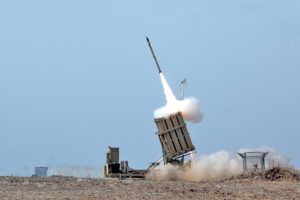Raytheon [RTN] and Israel’s Rafael have signed a new joint venture to produce the Iron Dome missile defense system in the U.S., the two companies said Monday.
A decision on the location for the new facility is expected before the end of the year, according to company officials.

“This will be the first Iron Dome all-up-round facility outside of Israel, and it will help the U.S. Department of Defense and allies across the globe obtain the system for defense of their service members and critical infrastructure,” Sam Deneke, Raytheon’s vice president of land warfare and air defense business, said in a statement.
The Raytheon RAFAEL Area Protection Systems joint venture will build Iron Dome’s Tamir interceptor and launcher as well as the SkyHunter missile, the U.S. version of Tamir.
The Army has previously purchased two batteries of Iron Dome, per a directive in the fiscal year 2019 defense authorization bill to acquire the system, to serve as an interim cruise missile defense system while it continues pursuing long-term Indirect Fire Protection Capability (IFPC).
Lt. Gen. Daniel Karbler, head of Army Space and Missile Defense Command, told lawmakers in March that Iron Dome is currently unable to integrate with its future missile defense command platform, the IBCS system being developed by Northrop Grumman [NOC] (Defense Daily, March 12).
“In the near term I would say no, [Iron Dome is] not feasible yet. We’ll have to do the assessment after we train up the soldiers on the Iron Dome systems when we get them,” Karbler said at the time. “I agree, it’s a combat-proven system. The Israelis have shown it is a very capable system. So, again, we have to look at how deployable it is and how well can we get it into theater and then operate with the soldiers given that it might not be as maneuverable as we want it to be.”
The Army is planning to field its first Iron Dome batter by the end of the year.
Karbler has also said previously the ability to integrate with IBCS will be a requirement for participants in spring 2021’s “shoot-off” to find a long-term IFPC solution.